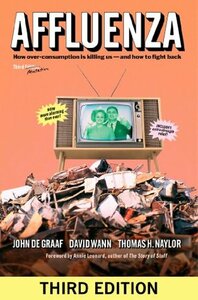Take a photo of a barcode or cover
45 reviews for:
Affluenza: How Overconsumption Is Killing Us and How to Fight Back
Thomas H. Naylor, John De Graaf, David Wann
45 reviews for:
Affluenza: How Overconsumption Is Killing Us and How to Fight Back
Thomas H. Naylor, John De Graaf, David Wann
Why are we always busy and stressed out despite the huge advances of the last century? The authors convincing detail how productivity and technology increases have left us much richer than our grandparents - but instead of living the same and working less, we acquire an abundance of formerly luxurious (or non-existent) goods without leaving any more time to clean our bigger houses or reorganize, repair, and refill all our stuff. I disagreed with many of the minor points and prognoses that betrayed liberal underpinnings, and it's a little dated when it talks about shopping malls, but overall Affluenza is a compelling argument that the short-term satisfaction of consumption is ultimately unsatisfying, and the only path to true satisfaction is to embrace voluntary simplicity. It's largely a secular argument, but it greatly overlaps with a Christian ethos of materialism and possessions.
dark
informative
inspiring
reflective
sad
medium-paced
I dare you to read this and then not make a change in your consuming habits.
DNF. This material is better consumed as the television medium it’s based on. I found it hard to remain engaged with the text as it jumps around from related topic to topic. It needs better organization. The stats are interesting. Definitely assumes the reader is middle class and more than likely white.
My favorite quote from this book is from T.S. Eliot: "We are the hollow men. We are the stuffed men" (page 72). This hollowness or emptiness of modern American life, the breaking up of families and communities, the pollution in the environment, according to the authors, is all in large part due to affluenza, "a painful, contagious, socially transmitted condition of overload, debt, anxiety, and waste resulting from the dogged pursuit of more." (pg.2)
I love the ideas in this book and I liked how it made me search myself for materialism and excess. I think a yearly checkup would be a great idea. But while I thought this book was a good introduction to these ideas, I wonder if I would've preferred the documentary upon which this is based because the writing style DROVE ME CRAZY! The first 170 pages are setting the stage, painting a portrait of American culture with almost randomly selected statistics and anecdotes; every paragraph of every section in every chapter could begin with the word "meanwhile." For example, part of the chapter "Chronic Congestion" could be summarized as "Airlines are congested with stuff. Meanwhile, in California, a woman was almost hit by a falling piece of airplane. Meanwhile, Jim in British Columbia collects space junk. Meanwhile, University of Arizona "garbologists" (garbage anthropologists) are studying Tucson landfills." Wha? I had to force myself to keep reading. Then, when strategies to combat affluenza were finally presented, I found those strategies to not be, well, not especially helpful (i.e. "lobby the government to reduce annual working hours" - seriously? I can see lobbying your employer, or choosing a career that is less demanding, but federal mandates? Another suggestion: "consider co-housing" - uh, maybe not).
I would recommend this book to anyone who is interested in these issues (and maybe even some who are not!). But maybe "Your Money or Your Life" or "Simple Prosperity" would be better books for me, I don't know (haven't read them).
I love the ideas in this book and I liked how it made me search myself for materialism and excess. I think a yearly checkup would be a great idea. But while I thought this book was a good introduction to these ideas, I wonder if I would've preferred the documentary upon which this is based because the writing style DROVE ME CRAZY! The first 170 pages are setting the stage, painting a portrait of American culture with almost randomly selected statistics and anecdotes; every paragraph of every section in every chapter could begin with the word "meanwhile." For example, part of the chapter "Chronic Congestion" could be summarized as "Airlines are congested with stuff. Meanwhile, in California, a woman was almost hit by a falling piece of airplane. Meanwhile, Jim in British Columbia collects space junk. Meanwhile, University of Arizona "garbologists" (garbage anthropologists) are studying Tucson landfills." Wha? I had to force myself to keep reading. Then, when strategies to combat affluenza were finally presented, I found those strategies to not be, well, not especially helpful (i.e. "lobby the government to reduce annual working hours" - seriously? I can see lobbying your employer, or choosing a career that is less demanding, but federal mandates? Another suggestion: "consider co-housing" - uh, maybe not).
I would recommend this book to anyone who is interested in these issues (and maybe even some who are not!). But maybe "Your Money or Your Life" or "Simple Prosperity" would be better books for me, I don't know (haven't read them).
I received this book as a Goodreads First Reads win.
I read the first version of this years ago and found it thought provoking and inspiring. It prompted some hard thinking about the point at which I feel I'm working too much with not enough personal gain, and the hours I'm willing to put in for a wage versus what I enjoy doing with my life. All those years ago I realized that more than 30 hours is not time I want to put in for a wage w/ decreasing returns in satisfaction and connection to my family & my community.
Here, years later, I got a chance to read the 3rd Mutation of this book and realize that while I've never budged from my willingness to work more than 30 hours a week, I spend 10 hours a week driving to & from that job. Once again I'm looking at my life and questioning what I can tweak to find more satisfaction in my life, more connectivity with those in my life, more interaction with my community.
The one down-side I found in this book is the lack of ideas for how to get the members of one's family to accept and adjust to fewer consumption-related activities and more connetion and interaction with our society.
I read the first version of this years ago and found it thought provoking and inspiring. It prompted some hard thinking about the point at which I feel I'm working too much with not enough personal gain, and the hours I'm willing to put in for a wage versus what I enjoy doing with my life. All those years ago I realized that more than 30 hours is not time I want to put in for a wage w/ decreasing returns in satisfaction and connection to my family & my community.
Here, years later, I got a chance to read the 3rd Mutation of this book and realize that while I've never budged from my willingness to work more than 30 hours a week, I spend 10 hours a week driving to & from that job. Once again I'm looking at my life and questioning what I can tweak to find more satisfaction in my life, more connectivity with those in my life, more interaction with my community.
The one down-side I found in this book is the lack of ideas for how to get the members of one's family to accept and adjust to fewer consumption-related activities and more connetion and interaction with our society.
Some parts were a bit weak & sort of made me think of those old "I am Joe's Stomach" films we saw in school, but overall an interesting book and one well worth reading
informative
fast-paced



